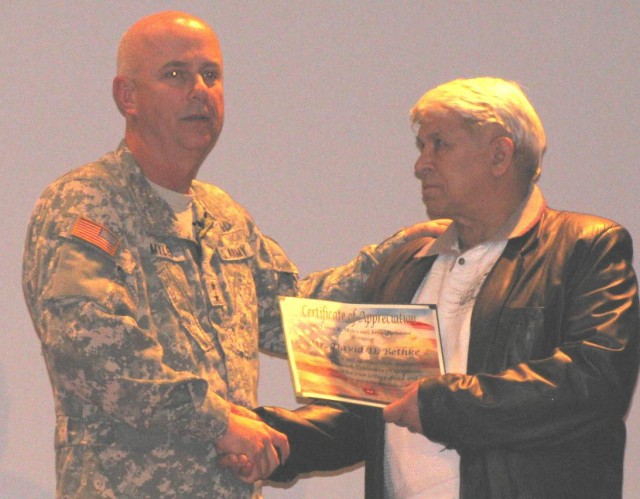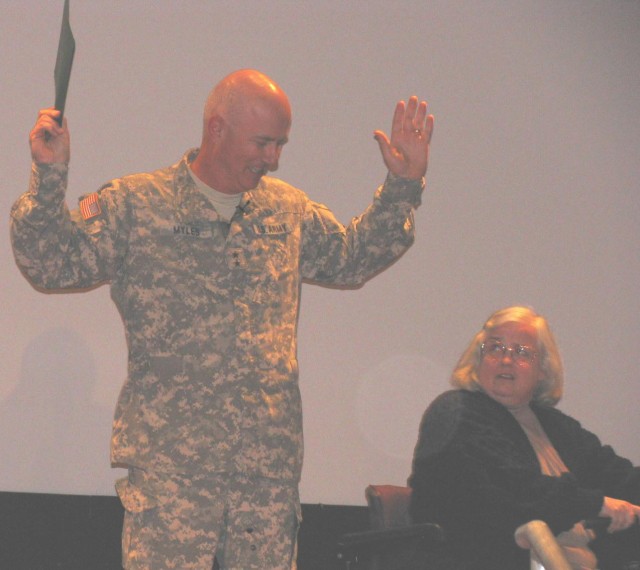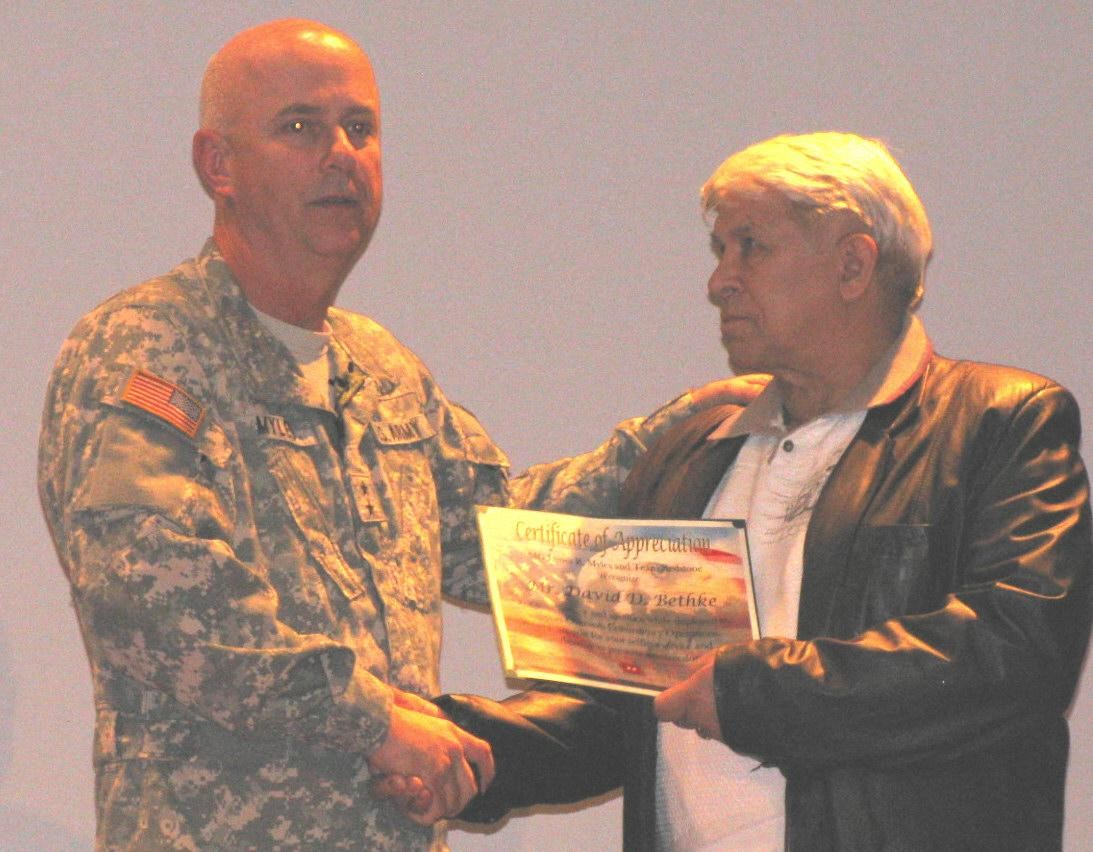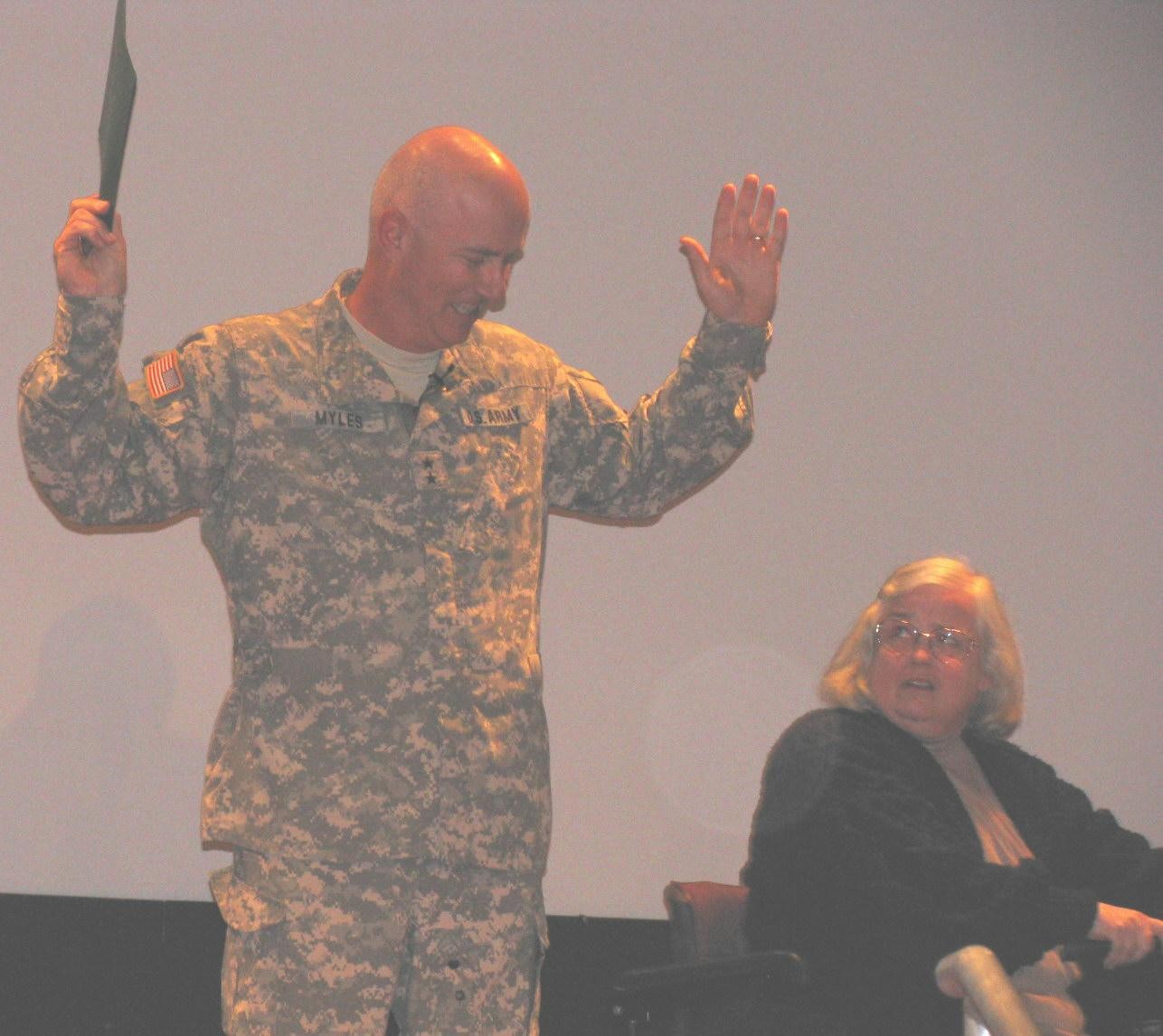Crispin Banda has deployed to Iraq three times.
But that's not enough. He has just volunteered to deploy a fourth time. He will leave in June for a 179-day deployment to Balad.
Although he is very much a part of today's war effort, Banda no longer wears a uniform. The retired sergeant first class deploys as a civilian, representing the Logistics Support Activity and the logistics information warehouse.
What motivates Banda to volunteer to travel to a war zone'
The eyes of the Soldiers.
"I've traveled all through Iraq training Soldiers," he said. "It's all about the war fighter. I can see it in their eyes. I want to be there to help them. I feel our mission is important to the war fighter. I'm a DA civilian teaching them. I don't carry a gun. I carry the weapon of knowledge."
When Banda made his first trip to Iraq in 2005, Soldiers were using a time-consuming and often frustrating manual system to get damaged equipment - primarily rolling stock - in the repair chain. Banda changed all that by teaching them how to use the more efficient and faster automated reset management tool.
"Our mission is to save lives and save government money," Banda said. "When we took the ARMT to Iraq, all the FOBs (forward operating bases) requested training. I trained at 20 different FOBS in 24 days.
"Reset is a big thing because of the shortage of equipment. The training I provided allowed units to get equipment back to the depot to get repaired at a quicker rate. The goal is to get equipment repaired or refurbished and brought back up to full combat capability."
The civilian work force volunteering to deploy to the war zone in Iraq, Afghanistan and other parts of the world was the central focus of the third Team Redstone Deployed Workforce Recognition Ceremony in Bob Jones Auditorium on April 7. Crispin was among 150 employees - most civilians, a few Soldiers - who were recognized by AMCOM and Redstone Arsenal commander Maj. Gen. Jim Myles.
"You do the Lord's work to help keep the Soldier alive," Myles told the work force gathering. "You guys are inside 30 miles of Baghdad. You guys are getting closer to the city in terms of the support you provide in this overseas contingency operation. You are so important to our Soldiers."
Myles talked about the innovative measures civilians are taking to address problems on the battlefield. He mentioned recent developments to put the Avenger gun on Kiowa helicopters to solve a reliability issue. Those developments involved Soldiers and civilians working both in theater and at Redstone Arsenal.
"Employees at PEO Missiles and Space and PEO Aviation married together to come up with a solution," Myles said. "That put them real close to the Soldiers in making a difference."
Regardless of whether a civilian is a comptroller, logistics engineer, trainer, reset engineer or any number of other positions, "you are making a significant impact to our Soldiers," he said. "Every one of you makes a difference. It takes a team."
Although civilians are making a difference in overseas contingency operations, Myles said they often don't want to be honored for their support.
"There are some heroes among us ready to go in the theater of operations. They say 'Send me. Let me go in.' They step up and do the mission. And that makes you a hero," the general said.
"We know who you are and where you are. It's important to us to make sure you don't think we don't appreciate what you do."
Following his comments, Myles took the time to shake the hand of every civilian honored at the ceremony and to tell the audience what each has done for their nation. Supporting various logistics efforts, developing software in the field, analyzing helicopter readiness, establishing C-RAM capability to locate and destroy enemy rockets and mortars, fielding aviation ground systems, building infrastructure, gathering data and information, maintaining aircraft and countering the threat of improvised explosive devices are all jobs that civilians have undertaken in theater.
For many civilians, deploying means venturing into unknown territory, both personally and professionally.
James Cox of AMCOM's Acquisition Center was the first civilian contracting officer in theater when he deployed to Kandahar, Afghanistan in 2003.
"At that time, the military did not like civilians working with them," Cox recalled. "I had to work with these Soldiers as a team member. I was successful because I did my job and remained the person I was."
Cox proved he could do the job and, along the way, dispelled many of the anxieties Soldiers had with working closely with Army civilians.
"They thought I was going to take their job. But we all had our own jobs to do," Cox said. "A lot of times a contracting officer has to say 'no' and no one likes to hear that. But I found ways to work with them."
In his job, Cox managed acquisitions for things such as large rocks needed to create landing pads for helicopters in the sand, gravel for walkways, and materials for building schools and clinics, and digging water wells. He handled acquisitions for the first compound built for the Provincial Reconstruction Teams in Kandahar.
And, yet despite all the projects he worked on in Afghanistan, Cox kept a low profile after he returned from his deployment. He didn't feel his accomplishments were appreciated or understood. Myles' ceremony has changed that perception.
"The ceremony was great," Cox said. "It shows what the general says. He is concerned about the Soldier and those who support the Soldier."
Nora Crawford of AMCOM G-8 got that same impression from the ceremony. She deployed as a resource manager for six months in 2008 in support of the 3rd of the 401st Army Field Support Brigade in Afghanistan. She will deploy again in early May, this time to Iraq.
"The first time I went it was really a call from God," Crawford said. "I was leaving work and I felt I was instructed to go back into my office, turn my computer back on and to volunteer. So, I did that.
"This second time, I was requested. It's an honor to be asked to serve. I get a lot of direct gratification knowing I'm serving my country as well as the war fighter team."
During that first deployment, Crawford received the commander's combat war fighters award. Her capabilities with managing a $64 million program for the AFSB proved she's a valuable asset to any military unit.
As the first woman to deploy from her organization, Crawford has set an example for her co-workers. She has coached three other female employees interested in deploying.
Crawford, who is married to a 23-year Army retiree, is deploying again with the blessing of her husband. And although she appreciated the deployed work force recognition ceremony, she said she does not need accolades to continue her mission.
"I don't serve for this kind of recognition. I serve for the self-gratification knowing I support the war fighter," she said.
And, in Myles' words, that combination of service and humility makes Crawford a hero.




Social Sharing